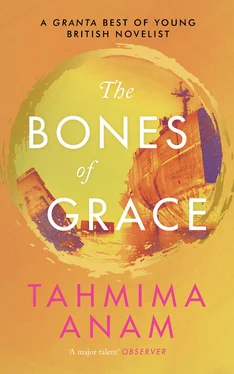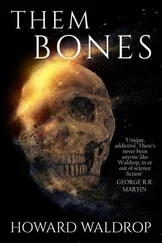‘Why not? Dolly said we should start thinking about setting the date.’
‘Oof Ammoo why?’
‘Why not? Is something the matter?’ Ammoo peered into my face. ‘Something wrong between you?’ She sometimes liked to act as if my engagement to Rashid was the only good thing in her life.
‘I’m on the verge of a spectacular failure — can’t you see that?’
Abboo reached over and put his hand on my shoulder. ‘Okay, sweetheart, you take your time.’
Ammoo poured herself a glass of water. ‘What do I tell Dolly?’
‘All I ever wanted to do was find that stupid fossil,’ I said.
She took a gulp of water and put her glass down loudly. ‘It’s fine,’ she said; ‘you people do whatever you like.’
Your latest message to me was: Trouble in Mind . In my head I still couldn’t resist telling you about every small thing that happened, but I had replied simply: Don’t Let Me Be Misunderstood . I played the music you gave me, listening for clues as to whether I would ever see you again, telling myself it shouldn’t matter, but knowing that it did, more than I could admit, and I thought again and again about Zamzam, and all the choices people made about their loyalties, and I knew that, no matter what I did, there would always be that tug in another direction, a headwind that would cast a sweeping and overwhelming doubt.
My father’s village was three hours out of Dhaka and at the last minute I had agreed to accompany him to the wedding of a distant relative. I had played kabaddi with the children, watched my cousins fish in the pond beside the family compound, and finally, with leftover biryani packed into the trunk of the car, we started for home. It was early evening, and we’d had good luck with the traffic, so we were maybe twenty minutes from Chowrasta, the main intersection leading into the city. The light was softening and fading, and beyond the narrow highway and the string of shops were neon fields of young rice. Suddenly the car lurched, then stalled. Our driver, Abul Hussain, switched off the engine, then restarted it. The car whinnied, then shuddered to a stop. Abul Hussain turned around and said, with a tremor in his voice, that we had run out of petrol. He had meant to fill the tank in the morning and forgotten. He eased the car to the side of the road and then bolted out, making for one of the roadside shops to get help.
‘Stay in the car,’ Abboo said, following him. I opened the doors and let the evening air drift in. After a few minutes they both returned. The petrol station was several miles away. Abul Hussain would start walking and hope to find a rickshaw on the way. I got out of the car and wandered over to a vegetable cart, admiring the neat pyramids of gourd, pumpkin, and eggplant. Ammoo would be happy if I brought home some vegetables — she would say, oh, the marrow is so much sweeter outside of Dhaka — so I tried to get the attention of the man selling them. I was about to pay when I heard someone calling my name, and because I was in the middle of nowhere and the sun was about to set, I spun around with an aggressive word on my lips and saw that it was, in fact, Rashid, smiling down at me, a halo of hair framing his face.
He hugged me, his shirt stretched across his shoulders. ‘What are you doing here?’ I asked, my mouth against his ear.
‘Your father called me,’ he said.
I smelled his skin beneath soap and aftershave. ‘Thank you,’ I mumbled. He continued to hold me, unlike him to care so little that people on the street had begun to stare.
That morning, Jimmy had sent me a link: BODY OF DISSIDENT FOUND OUTSIDE OF QUETTA read the headline. Though the man bore marks of torture, the authorities were refusing to tender any sort of explanation. Zamzam’s mother, Jimmy wrote, was still striking outside the Quetta Press Club. Abboo was getting ready for the trip to the village, pulling on his sneakers and ordering Bashonti to pack a bag of oranges for the drive. I asked if I could come with him, and he was of course overjoyed, assuming it was a sign of my recovery from whatever strangeness had gripped me since my return from Pakistan, but the road out of Dhaka, the children swarming around my knees, tilapia in the pond, all these images were meant, if not to erase, then at least to soften the picture of Zamzam, face down in a ditch, as dead as Ambulocetus .
Rashid had sent his driver in search of Abul Hussain — they would soon return with the petrol. He suggested we wait together at a small restaurant down the road. ‘Why did you call him?’ I whispered to Abboo as we climbed into Rashid’s jeep, but Abboo didn’t reply.
We took our seats on a row of plastic chairs in the restaurant, which was nothing more than a long, narrow room jutting out of the highway.
I said I needed to wash my hands, and the waiter pointed to a hallway. The bathroom was disgusting. There was no lock so I leaned against the door and dialled your number. I had 300 taka of credit on my phone, so if you answered I would only be able to talk for a minute or two. After three rings, I hung up. I splashed water on my face. There was no paper. I rubbed an arm over my face and headed back to the others, trying to form the sentences I would have to say to explain it all to Rashid, to appear calm and in control, as if my ignoring him for the past few weeks was part of some premeditated plan.
‘It doesn’t matter,’ he said. ‘You don’t have to take everything so personally. Let’s just focus on the good news, which is that you’re here sooner than we thought, and forget about everything else.’
Forget everything else. How sweet that would be, how wonderfully pleasant. ‘I’m an idiot,’ I said. I examined him closely, his mother-of-pearl cufflinks, the untroubled way he bore himself. At the table he passed around the small glasses of tea, and I heard Abboo sighing as leaned back against the chair and closed his eyes. At that moment my phone buzzed and I thought it might be you, so I pulled it out of my bag. It was Jimmy. It isn’t him , the message said simply.
Rashid and I went out the following night, to a Chinese restaurant we had frequented in high school, and afterwards we went to Movenpick and shared an ice cream in a cup, and he thought to provide two spoons, and I wondered if I was sharing that ice cream with you, Elijah, if we would have shared a spoon with no concern for who was eating more of it, and this thought, for some reason, made me want to shout out to no one in particular that I was being presented with an impossible choice. Then it was Sally’s birthday, and we all took a boat ride together on the Buriganga. On the third evening, Rashid brought up the subject of marriage, and when I asked why, he said, ‘Because that’s what we were always going to do.’ To you I wrote: I Think It’s Going to Rain Today . And you: Cry Me a River .
I deleted your playlist from my phone and humoured Rashid while he talked about moving into a flat. I began to suspect that was an imminent end to my problems, an end to living and reliving a scrap of a week, obsessing about Diana trapped in the ground, imagining the look on Zamzam’s face as he was loaded into the back of that van. The lie upon which my whole life rested. All of it.
In the evenings Rashid and I sat on the balcony and swatted mosquitoes, sometimes sharing a cigarette, staring out at the lake and the scatter of buildings on the other side. Sally’s pregnancy was starting to show, and the four of us went to parties where Rashid mixed cocktails and held me while we danced. I liked that he was a poor dancer and I could look into his eyes as he made jerky movements with his arms. He sneaked into my room a few times, leaving without a trace before morning, not even his scent lingering on the sheets.
Читать дальше












